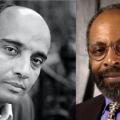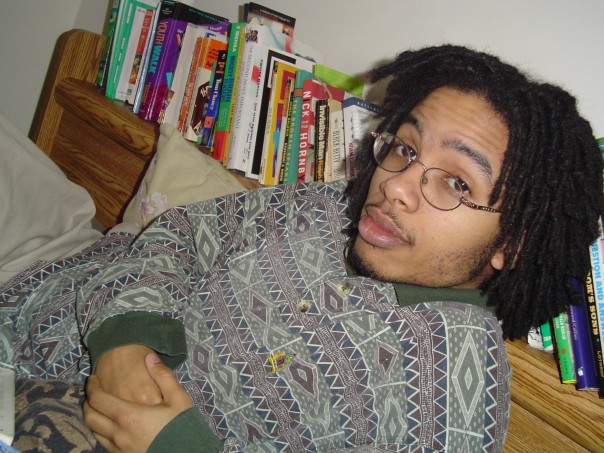142. Final Chat with Chike Jeffers
Posted on
How Africana philosophy looked to a young Chike Jeffers, coming into the field in the early 21st century.
Themes:
Further Reading
• C. Jeffers, “Strategies of Organization: Paget Henry and Traditional African Philosophy,” in M.P. Banchetti-Robino and C.R. Headley (eds.), Shifting the Geography of Reason: Gender, Science and Religion (Newcastle-upon-Tyne: 2006).
• C. Jeffers, The Black Gift: Cultural Nationalism and Cosmopolitanism in Africana Philosophy (doctoral dissertation, Northwestern University, 2010).
• S.B. Diagne, African Art as Philosophy: Senghor, Bergson, and the Idea of Negritude, trans. C. Jeffers, new edition (New York: 2023).





Comments
Going to miss this series.
Going to miss this series.
In reply to Going to miss this series. by Erik Helgesen
Very glad that you found it useful!
I'm thankful to all listeners for their support.
Corrections
It's intrinsic vs. extrinsic, not "internal vs. external" (re the contrast Appiah drew, discussed shortly after the 27 minute mark). Also I said "Charles Houston" when I meant to say "Charles Hamilton" (43:09).
Thank you
Thank you Peter and Chike for a great series on Africana philosophy that introduced me to a whole new field of topics and authors I wasn't very much aware of! Looking forward to the series on China!
In reply to Thank you by Daniel
Africana series
Thanks, so glad you enjoyed it!
more thanks
Just wanted to jump on the bandwagon and thank you two for a great series on important material that would otherwise be hard to piece together (and for getting in a mention of Sun Ra !). And given my age and analog preferences, I’m happy that there will eventually be book versions to help recall the topics (at least in principle, i.e. given OUP’s schedule for getting out the paperback versions, I may not actually live to see that ! :-)).
In reply to more thanks by Karl Young
Book versions
Thanks, I'm glad you enjoyed the series! We will try to get those books out as fast as possible; actually you're reminding me that I should ask about the paperback version of Renaissance and Byzantine philosophy.
Many Thanks
The impact of what you, Peter and Chike, have done in this podcast series can't be understated. I imagine I speak for a lot of people when I say that the series was my introduction to Africana philosophy. The podcasts (and the books) will continue for many years to be the introduction to this rich tradition for many, many people--scholars, students, and lay people alike. When somebody gets around to writing (in book or podcast form) the history of Africana philosophy in the 21st century, they'll be forced to reckon with the towering achievement of this series, the vast influence it'll continue to have, and the great debt they'll owe to you two.
I want also to express my own debt of gratitude. I've enjoyed many hours of silent contemplation while listening to these podcasts, and I can't articulate the impact those hours have had on my development, intellectual and otherwise. Thank you both for teaching me. Thank you for this series.
In reply to Many Thanks by Matthew
What powerful words
Thank you for that prediction and for the kindness in your expression of gratitude.
Impactful and profound
Congratulations on such a profound and impactful podcast series! Your dedication to introducing Africana philosophy to countless individuals is truly commendable. Your work will undoubtedly leave a lasting legacy, shaping the intellectual landscape for years to come. Thank you for your invaluable contributions and for enriching the lives of so many with your insightful discussions. The world is better for it!
In reply to Impactful and profound by Cecilia O.
Thank you Cecilia
Thank you for all of your vital support.
Thank you!
Thank you for this fantastic series! I wish it could have been longer, but of course it does have to fit in a book.
I loved Chike's anecdote about his first philosophy conference.
It's hard to pick out favourite episodes, but for me, the highlights of the 20th century segment were Black theology, the two Táíwòs interviewed at once, Afrofuturism, and the mini-series on Black feminism in the 70's and beyond.
In reply to Thank you! by Neville Park
Thank you very much
Your encouraging comments as the series went on were greatly appreciated.
Name of Track + When are the OUP Africana boosk coming?
1. What is the name of the track that played at the end of the episode, have not heard that before, timestamp is 50:55 - 51:07 right before the episode ends with a clip of St Thomas by Sonny Rollins
2. When is the OUP Africana book (Pre-20th Century book) going to be published?
In reply to Name of Track + When are the OUP Africana boosk coming? by dukeofethereal
Track
Thanks
I enjoyed the series. Interesting, informative and thought-provking. Some figures I knew nothing about. Some figures I learned a little mre on. A few figures I will look up further: Baron de Vastey, Octavia Butler. The series I imagine will have taken much effort, reading and time. The latter I also imagine you're both short of. It's appreciated. I feel fortunate to have been born at a time with access to things like this, danke :)
In reply to Thanks by 27 March 2024
Africana series
Thanks so much for this generous comment! I learned a lot too, as you might imagine.
Add new comment